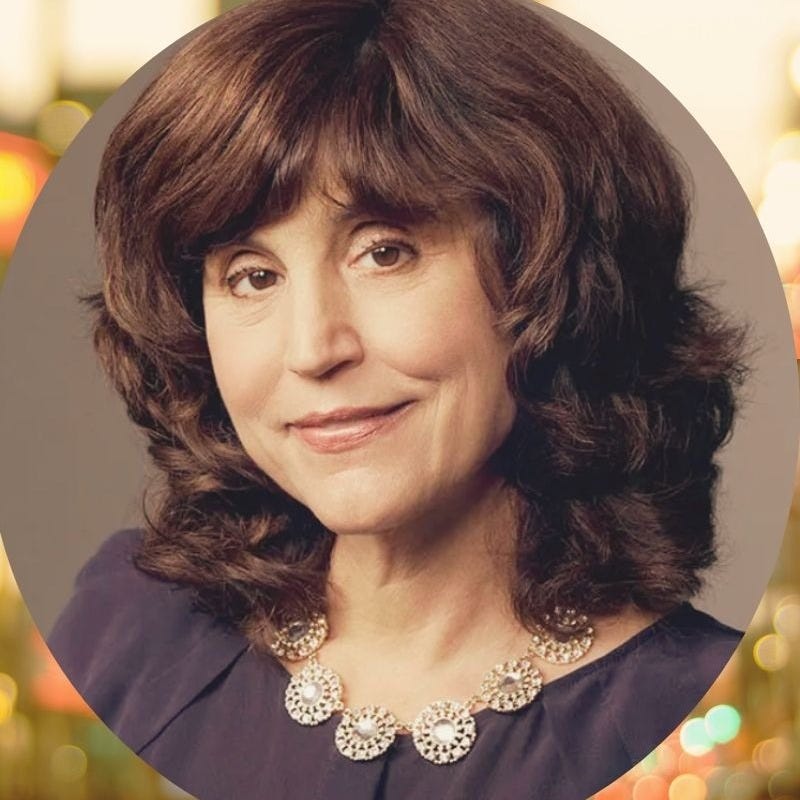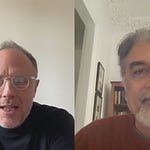My guest today is Kim Masters, Editor-at-Large of The Hollywood Reporter and host of KCRW's The Business. A former correspondent for NPR, she has also served as a contributing editor at Vanity Fair, TIME, and Esquire, and was a staff reporter for The Washington Post. She is the author of "The Keys to the Kingdom: The Rise of Michael Eisner" and the "Fall of Everybody Else," and co-author (with Nancy Griffin) of "Hit & Run: How Jon Peters and Peter Guber Took Sony for a Ride in Hollywood." Masters was named Print Journalist of the Year by the Los Angeles Press Club in 2012 and received the Distinguished Journalist Award from SPJ's Greater Los Angeles Chapter in 2018.
It’s said that there are three centers of power in America. New York, the financial center of power; Washington, the political center of power, where you worked. And Hollywood, the cultural or entertainment center of power. There are some obvious similarities dealing with the powerful people in all these places. But what's something that you've learned dealing with Hollywood executives?
Washington and Hollywood are very different. Yes, there's power and certainly a lot more money in Hollywood. The truth is, Washington is much easier because there are built-in opponents, there's a built-in conflict. I always say if the Democrats won't tell you, then the Republicans will.
So it's pretty obvious if there's an issue, who is going to be on which side, and there are all these non-government organizations who find out a lot and become sources and tell you all kinds of things about what's going on behind the scenes. Here, in Hollywood, it's so much more difficult because the alliances are oftentimes fleeting, short-lived. Yes, there are feuds, but sometimes people decide they're going to overlook the feud.
Here, they don't have any incentive to help you. And I think that the only way to get connected with sources and get your calls returned — I'm sorry to say — is to make these people fear you.
If they don't fear you, they don't respect you. I'm talking about the top level. They're powerful, they're wealthy, they're impatient, and if they don't have some amount of fear that you could write something that would be bad for them, they just don't see why they need to bother with you.
I've worked for major organizations, like the Washington Post, TIME, and NPR. All of them look down their noses on anybody here in Los Angeles who's doing the coverage.
They think: “Oh, well you're just doing that stupid Hollywood stuff and we're more superior with our important stories” but the truth is it's much harder to get a story here than it is to get a story in Washington. It just is.
That is such a fascinating insight. I think it's rare to hear a journalist talk frankly about those sorts of power dynamics. Can you tell us a story about how you started to understand that?
I had worked for this guy Steve Brill, who had a publication called American Lawyer when I was doing legal stuff. Steve was an absolute killer investigative reporter.
Steve took this approach to covering these very upscale, white-shoe, Manhattan law firms, where these lawyers were completely arrogant. They had no intention of talking to a reporter. He would ask questions like: “How much money do you pay your associates? What are your partners getting?” They would just think you were from Mars asking that stuff. But Steve set about bending this world to his will. He actually changed that world by cracking it open with his journalism.
"I broke one really epic story, and everything changed overnight. Suddenly, I was having lunch with the heads of Warner Brothers."
He found things out. He published them. And within a certain period of time, the biggest, most snobbish, exclusive lawyers at big law firms were asking him to lunch. I thought: This is what I need to do to Hollywood. It was really hard because you have to figure out how you are going to ferret out enough information that these people are going to notice.
But I did. I broke one really epic story, and everything changed overnight. At the beginning, nobody would talk to me. I called Disney. I said I wanted to interview Michael Eisner. The PR guy at the time laughed so hard that he called me later to apologize. But once I broke this big story, suddenly it was like, why don't you come over and meet Michael Eisner? Why don't you have lunch with Barry Diller? Visit Barry Diller in his office. Have lunch with the heads of Warner Brothers. Everything changed.
What was the big story that you broke?
I broke it totally by accident. There was a guy named David Puttnam, now Lord David Puttnam, who was a producer of movies like Chariots of Fire and The Killing Fields. He had been put in charge of Columbia Pictures and it was coming up on his one-year anniversary. I was sitting there at The Daily News and I was completely unaware that he had infuriated very powerful people, and he was on incredibly thin ice. But because I was asking about a story that certain powerful people wanted told, they wanted somebody to write that this guy was making a mess of things in their opinion, and they started to tell me some things.
What happened was David Puttnam got brutally fired. Pretty much everybody in the media world, the Wall Street Journal, the New York Times, everybody was chasing David Puttnam for an interview. But I had this notebook full of stuff that I had gotten completely by accident.
"The only way to get connected with sources and get your calls returned, I’m sorry to say, is to make these people fear you. If they don’t fear you, they don’t respect you."
I called and left a message with key points that I was planning to put into this story. And I got this call back from him. I'd never spoken to him. I didn't know him. And the first thing he said was: “You leave a hell of a message.” And then he said, “Why don't you come over to the studio and I'll do the interview.”
I knew how impactful a scoop that was. It was a really, really big one at that moment because it was a big pitched battle. Puttnam was supposed to represent the creatives. And the bad guys in Hollywood were supposed to represent the suits. I just knew that was gonna change everything — if I could hold on to it. I was terrified he'd turn around and go to the LA Times or something. But he kind of got this little laugh, I think, out of doing it for this obscure newspaper.
It did change everything. I went to a party that night and there was some guy who was at The Hollywood Reporter staggering around saying: “She scooped the world! It's a great memory. It was just magic. He was true to his word. He didn't talk to anybody else.
Kim Masters Reveals How the Notorious Firing of Columbia CEO David Puttnam Launched Her Own Career
So did things change kind of overnight?
Yes. That was the breakthrough. Everybody, I think, kind of got a memo: This person might need to be reckoned with. And then it was about meeting me. I was quickly wooed away by Premiere Magazine.
How did other journalists react, if at all, to your scoop?
Everybody was jealous — as I would have been if somebody else got it. For a long time, I really felt like this was my playground because a lot of people just weren't being very aggressive about covering Hollywood. It wasn't done until it was. When somebody else stepped up and did a good, strong story, I thought, “Well, now at least I'm not the only one that people are complaining about that I'm too tough and too mean.”
When you arrived and started reporting with this new approach of being aggressive and asking the tough questions and playing a tough game, do you think it changed the way that journalism was done in Hollywood?
I would hate to lay that kind of a claim to something like that, but I feel like in time, there was more aggressive reporting. Sometimes, but not all the time. I myself wrote for Vanity Fair, but Jim Stewart and Connie Bruck wrote for The New Yorker, and they did do high impact stories. But most of them were sort of visiting the beat, not really living the beat.
"If you’re going to do stuff here, you have to be prepared to get yelled at. They will yell."
It's kind of a mixed bag. There are certain reporters who are aggressive and do amazing work. There seem to be some reporters who — I know many — they don't want confrontation. They don't want to get yelled at. They keep it between the lines and they don't go for that edge, you know?
And I would be bored to death. I can't do that. It's not my nature. And, I think that the executives here figure out fairly quickly who they have to worry about and who they don't
Do you think it's a generational thing? You spoke about conflict — that was what piqued my interest. There are different ways of viewing the rewards and pitfalls of conflict as a societal dynamic between generations.
Some reporters just cannot handle any kind of confrontation. If you're gonna do stuff here, you have to be prepared to get yelled at. ‘Cause they will yell.
You talked about visiting a beat versus living it. And I think it would be interesting for students of journalism or people who aren't necessarily familiar with those terms to hear a bit more about that. Can you break down what you mean by visiting a beat versus living it? What are the differences? How does that work?
It's awfully hard to swoop into something, especially a community like Hollywood, and say: “I'm going to figure out enough of how this place works to do a story” if you're not here day in and day out and watching the interactions. I don't know how you can really know what's going on.
If you really want that sense of not just what they're telling you, but what does it really mean? What are they really saying? You have to kind of be here and be around these people and maybe go out to lunch with them and learn how to read them a little bit.
How do you read them? This is kind of a process question, but when you're sitting down for lunch with an executive in Hollywood, what are you looking for? What are you listening for?
If I have a specific story and I want to get a specific answer, that's a whole different thing.
If it's what we call the “relationship lunch,” I'm just completely simple about it. I go, and I have lunch. I sit down. We talk about whatever. We gossip. A little bit of this, a little bit of that. It's about building trust, so that they feel they can tell you things, so that you won't burn them.
"It’s a bad time in Hollywood. Nobody’s winning and everybody’s miserable and scared."
I don't have any big plan. People think I do sometimes. They think that I've got this whole strategy. I don't. I’m just pretty straightforward. All I want is to get the story and be right.
That's my whole agenda. I don't need to drop your name. I need to know the truth. I analyze more through listening than watching. You can tell if somebody's uncomfortable and you feel like they're lying. But I just listen to my own instinct, honestly.
I had a mentor in an earlier job. She really taught me to never take what they're saying at face value and use your sense about why are they telling you this? What is the real story going on here? I don't plot out questions or anything like that.
What's been the thing that's most surprised you after all this time covering Hollywood?
I'm surprised I've done so many Me Too stories. I am surprised that some of these people are such slow learners. It's like: “Did you think you were an exception? That nobody was gonna report on you? Or talk to a reporter? Or go to HR?”
The entertainment industry has gone through a pretty seismic set of changes recently. People are saying that the streaming services have destroyed the movie business and the subscription model isn't working. Where do you land on this question of the future of Hollywood?
I don't have stock in studios, but I, like other people, enjoy good entertainment. Yes, streaming has screwed up all the legacy companies. Netflix had that first mover advantage, and they were for many years valued as a tech company, so they could afford to just spend money like drunken sailors and build up this subscriber base. That's a formidable operation. And then everybody else started chasing them. And everybody else has lost hundreds of millions of dollars, billions of dollars, trying to do this.
It's very expensive to keep people attached to a streaming service. You have to have fresh material. If they're not watching something, they start saying, “Well, maybe I'll just drop that subscription.” It's been a very difficult thing for the studios. Nobody seems to have figured it out yet. We've seen legacy studios disappear. Fox is gone. 20th Century Fox doesn't exist anymore. Disney bought it and that's it. So you've got this empty lot. I think it's sad and I don't know what comes out the other side.
"I will do what I do and you're going to be the one that has to be scared to shut me out."
Amazon has a streamer. Apple has put its toe in the water. But you wouldn't want to put a lot of money on all these studios that exist right now still being here in a few years. Hollywood is going through a very difficult time. We don't know where it will come out. It's not that fun to cover. It's true there's a lot of news but it's all kind of grim. People are getting laid off and are getting desperate for work.
Nobody's winning and everybody's miserable and scared. Hollywood has always been scared as long as I covered them and I think for a long time they were just anticipating this moment. But now the moment is here and it is as is not fun as people thought it would be.
What about the way that journalists cover it? Has that changed or is that changing?
Journalism's in trouble too. Both industries are hurting. But there's still a core of us who are chasing these stories and competing with each other.
Alright, are you ready for a little lightning round?
Okay.
Your daily required reading list.
The Washington Post. The New York Times. The Wall Street Journal. I'm a big news junkie, so I was on Twitter and now I'm going to Threads. I pick up a lot that way. It really plugs you in too. You know what people are talking about and interested in.
Your favorite opinion columnist?
On politics, I like David Ignatius, who was my colleague at the Washington Post for several years. I think he's really great at foreign affairs analysis.
I was once in Jordan with a group of journalists and we interviewed King Abdullah. David Ignatius was there. He was perfectly polite and very dignified. There was another reporter there who I won't name, but who worked for a very prominent American newspaper, who referred to the king simply as “King,” prefacing all his questions with “King.” Not “Your Majesty” not “Your Highness.” Just King.
You'd think they might figure out the protocol a little bit…
There's so much frustration with reporters who don't frame what the real stakes are in all of this, and I think it's because they don't want to get shut out, right?
My view is: I will do what I do and you're going to be the one that has to be scared to shut me out. I'm not going to be the one scared of being shut out. It's not going to work that way. I wish more reporters took that attitude, honestly.
I worked in Iraq for many years and there was a similar dynamic where you had to get access to the military and your access was in large part determined by how well you were going to play the game. And if you didn't, then you were denied access. You were denied embeds. You were denied interviews with important commanders and generals and soldiers and bases and everything. So you had to figure out ways to make them pay attention to you, to make them listen to you and to take you seriously. It's a strategic game in a sense, isn't it?
I think it's an attitude that you need to have if you want to be better than average. It may be different in a war zone and where you're dealing with the military, obviously, but certainly in the White House, I think you can say, “I'm going to report in a way that you will want to talk to me.”
Your most, your most controversial opinion, Kim.
Oh God, I have no idea. You stumped me, Scott. I go back to typewriters. That's how old I am. How we did our jobs, typing in triplicate — I don't know how we did it! And I don't think I would have had my career if we didn't have word processing. I am not a person who can outline. I write stories in bits and pieces and I juggle them around.
My whole career was made possible by word processing. When I'm writing any story, I use Google like 25 times per paragraph. I often think, “How did we do this before?” You have to be very mindful of what sources are you looking at here, but what an incredible gift to reporters.
I was just having this conversation the other day with somebody about a time before typewriters even or word processors when people had to conceive and write the story in their head, and then type it out on a teletype and send it off basically fully formed.
Before I went on staff at the Post, I was covering a trial as a freelancer. It was Buchwald versus Paramount. Art Buchwald was the humor columnist who was very good friends with the Post editor Ben Bradlee. He sued Paramount for stealing his idea. I had to sit in the courtroom. We didn't have a laptop. We didn't have a phone. I had to sit there and take notes. And when it was finished, I had to run into the hall, find a payphone, and dictate the story. And I was very much aware that Ben Bradlee was going to read every single word about that trial. But I did manage to do it.
Ben Bradlee is the legendary Washington Post editor. Tell us a little bit about your experience with him.
In those days, when you got hired by the Post, the final interview was Ben. And it was not a rubber stamp. In one of the famous Ben stories, everybody wanted to hire a guy, and Ben came out of the interview and said: “No.” And everybody was like, “Why?” And Ben said, “Because nothing clanks when he walks.” Which is a great answer!
That's great.
So I go to the Ben Bradlee interview. After months you work your way up the ladder. You're going to talk to the managing editor, and then the editor, and on and on. And I had seen All the President's Men, which I always tell young reporters they should watch, about Watergate and the role that Ben played. And I went into that interview thinking, “This guy really has to be Ben Bradlee!”
I don't want it to be some pale imitation of this cool, tough editor that was on the screen in the movie. And I will tell you: he was that guy. We we just had this very good rapport out of the gate. I won't lie. I think he liked like young women and he kept telling everybody, “Oh, she has these dimples.”
He started telling these little off-color stories, and I thought, I have completely got this. I was so excited, and then he sort of leans back in his chair and says: “So you want to come to Washington?” (I was living in LA). And I thought, just for a nanosecond, my whole family was in Washington. I had this thought, like, oh God, I'm going to get this job and I'm going to have to go to every birthday and every dinner party…
But I didn't say that. I said, “Yes!” And he caught it. He said, “What? Why, what's going on?” And I'm like, “Nothing, nothing's going on! I totally want to come to Washington.” He would not let it go! I thought, can I say to Ben Bradlee, “You know, I have this mother…”
He went to the editor of Style after the interview. He said, “Why doesn't she wanna come?” The editor called me and said, “You can come later.” And I'm like, “Are you kidding? I'm coming, I'm coming, I wanna come to the Washington Post.” But I thought it was incredible that he caught just that little — you talk about, you know, listening, looking… He caught it. He really got me.
And it was huge fun. I did this big investigative story about illegal poaching. This guy smuggled in endangered species for trophy hunters under the auspices of the Smithsonian. And when the first installment of that ran, Ben came to my desk and said, “Do you sign autographs?”
And I thought, I can just be done with this career right now. I have climbed to the peak.
That is amazing, your moment of hesitation that he caught. That's kind of the art of journalism right there, isn't it? That kind of extreme attention to the little details.
I've done it myself. You just think, “Wait, what was that?” You don't dismiss it. Like Ben didn't.
Okay. Words of wisdom for aspiring reporters out there.
Trust your eyes and ears. That's why I would say listen very carefully. And when something doesn't make sense, or when there's one little word in a sentence that makes the whole rest of the sentence invalid, pay attention to that. I think it was very helpful for me to start with lawyers because lawyers are the king and queen of putting in a word that negates everything else they said. I see so many reporters not seeing that. I'll say, “Do you not see that?”
What about your number one “don't do?”
Don't burn a source. Don't lie. I think honesty shows. Even if people are on the other side of things, many times they respect the honesty. So be truthful at all times.
What book are you reading right now?
I was just going to start The Year of Magical Thinking.
Joan Didion. It's a great book.
Every night, it gets too late, and I say I'm gonna start it tomorrow night and then I get caught up in screwing around, looking at what funny things people are saying online.
Well, it is a kind of a magical realism kind of a year.
It sure is.
This interview has been edited and condensed for clarity and brevity.













Share this post